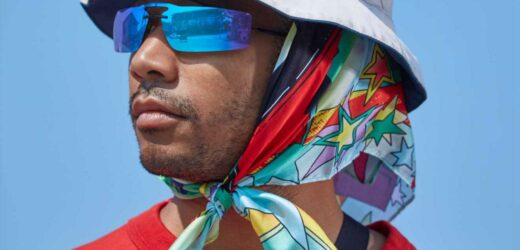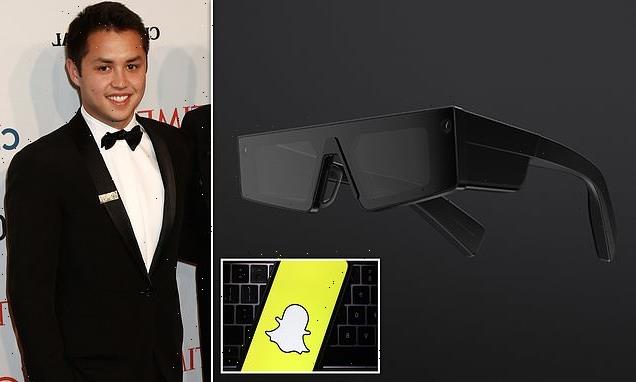By Mia Hughes
In Toro y Moi’s music video for “Postman,” the first single from his seventh and newest album Mahal, he sits behind the wheel of a loudly ornamented jeepney. A kind of eccentric taxi converted from a Jeep that is common in the Philippines, this model is emblazoned with the project’s title, which is Filipino for “love.” The car appears, too, on the album artwork, parked in front of the Golden Gate Bridge, and the strangely melodic sounds of its straining, sputtering engine flank the collection of songs.
The vehicle is a sort of portal, connecting the album with the physical world. It really does belong to Chaz Bear, the man behind Toro y Moi. He bought it on eBay, restored and decorated it, and now he takes it for drives around San Francisco, blasting his latest tracks from the speakers and starting conversations with passersby. The 35-year-old musician and graphic designer, Bay Area-based by way of South Carolina, is half-Filipino and half-Black, and this was one attempt to close the gaps between his heritage, his community, and his art.
“I wanted a guerrilla-style campaign, but I wanna go about it in a holistic way,” he explains. “It’s not to go viral, it’s not to get a bunch of people to show up and close the block down. It’s about the real-life interactions, the spontaneous pop-ups, and I want it to bring a little spark to the neighborhood.”
This drive for real-world connection is a fitting accompaniment to Mahal, Bear’s most tactile, unvarnished record yet. It’s all about analog drums and guitars and bass, imbuing it with a warm vintage tint that recalls ’60s and ’70s funk and jazz, with hints of Sly & The Family Stone and the Isley Brothers. It’s a rawer, looser sister to Bear’s psychedelic 2015 album What For?, the last time he made guitar music. Their titles, in fact, form a deliberate question and answer. (What for? Love.) “It’s a work of passion,” he says. “It’s not a record to be remixed a bunch of times and played in clubs.”
Previously, Toro y Moi has tended toward dance and electronica — from 2009 debut Causers of This, which pioneered the “chillwave” microgenre, to his most recent, 2019’s Outer Peace, which blended house music with psych-pop. Though he’s always been an independent artist (he jumped to Dead Oceans for Mahal from even smaller indie Carpark), there are few creative people who have had a wider influence across hip-hop, bedroom pop, indie rock, and dance music over the last decade. He’s collaborated with Travis Scott, Tyler, the Creator, and Logic. The latter is such a big fan that he sports a Toro y Moi tattoo.
The cult status comes in part from his chameleonic habit of flitting between genres and making himself at home in each one. He’s always made his albums on his own, and every note is carefully and tightly constructed. But recently, Bear has been trying to let go of control, influenced by the self-help writer Eckhart Tolle; Mahal is new in that he worked with live musicians and produced without overdubs or corrections. “I wanted the record to be noticeably lax and less uptight,” he says. It was exciting, too, to produce live instruments at his warehouse studio in Oakland, where previously he’s worked alone at a computer. “I was running up and down stairs with microphone cables and hanging microphones out of windows and shit like that. I really got to get my Abbey Road chops going. That was fun.”
The album’s lyrics explore capitalist mass production (“Magazine”), the alienating nature of technology (“Postman”), and the anxieties manufactured by social media (“The Loop”). “This record is very analog and vintage-sounding, but I didn’t wanna hide that we’re in 2022,” he says. “I don’t need Toro y Moi to be received as a nostalgic project. It’s a progressive project.” Bear doesn’t use public social media much these days. It’s a useful tool, he affirms, but one he has a necessarily cautious relationship with. “If there were social media in the ’60s, I don’t know if you would see Jimi Hendrix posting a shit-ton of pictures. As an artist, you kinda have to maintain the mystique in order to keep some cachet or you’ll just sort of become a YouTuber.”
It’s a particular feat for Bear to have stayed in the shadows as much as he has, given his high-profile collaborations. Travis Scott reached out to him in 2013, and they’ve worked together on a few tracks, most notably the 2015 single “Flying High.” The collaboration took Bear into Kanye West’s studio in Paris, and more recently he had a slot at Astroworld (he donated all profits to the families of those who died during a crowd surge at the festival). Meanwhile, Tyler, the Creator is an old friend, and Bear is featured on a couple of tracks, including the soulful two-parter “Fucking Young / Perfect,” from his 2015 album Cherry Bomb. And if the musical zeitgeist has shifted towards genre-blending, psychedelic dance sounds, and understated indie aesthetics, one could easily trace those back to Toro y Moi. Yet all the while, he stays on a small label, focuses on his place within his local community, and signs emerging artists to his own record label, Company Records.
“It’s cool to see how ideas can be traded from subculture to the mainstream,” he says. “I think that gap is closing, and it’s an even tighter vibration now, where you have artists like Caroline Polachek touring with Dua Lipa.” He’s noticed something similar in his design house, Company Studio, where he’s created clothing in collaboration with brands like Nike and Vans. “When I was in high school, it was not cool to be co-signing with brands. Now, the subculture is this alternative mainstream. It’s a new world.” He adds, “If we look at YouTubers and TikTokers and how [fame] is becoming more common — like, my cousin has 20,000 TikTok followers, and I only have 10,000! There’s something to learn from that. I think celebrity is dying.”
This sub-mainstream, anti-celebrity realm is where Bear is happy to stay, shaping larger waves from beneath the surface. He’s spent a good portion of his career wrestling with if he even wants to sink so much money and time into something much bigger than he ever envisioned. Mahal sees him finally settled. “There’s no right or wrong way to a career. You just have to want to play the game,” he says. “I’m at a point now where I’ve let go of any of those preconceived notions — what if this hurts me, or what if this puts me somewhere I don’t wanna be? You have to let go of that. It’s the only thing you can do.” After all, Mahal is the reminder of what Bear ultimately does it for. Love is all he needs.
Source: Read Full Article



